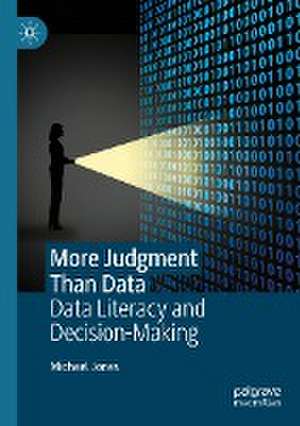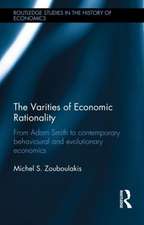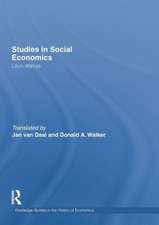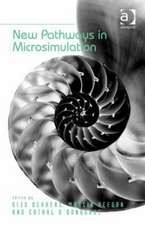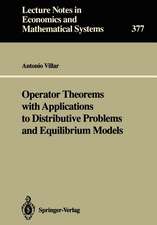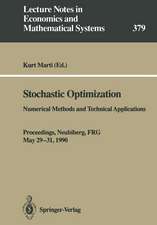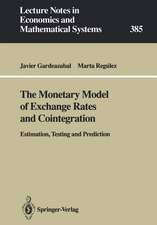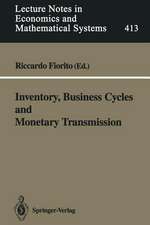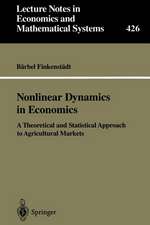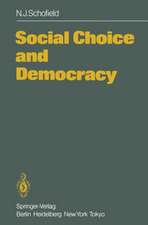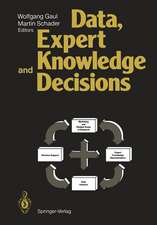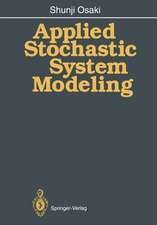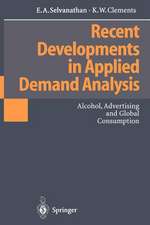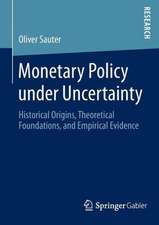More Judgment Than Data: Data Literacy and Decision-Making
Autor Michael Jonesen Limba Engleză Paperback – 25 aug 2023
Including data in the decision-making process can bring considerable clarity in answering our questions. Nevertheless, human beings can become distracted, overwhelmed, and even confused in the presence of too much data. The book presents cautionary tales of what can happen when too much attention is spent on acquiring more data instead of understanding how to best use the data we already have. Data is not produced in a vacuum, and individuals who possess data literacy will understand the environment and incentives in the data-generating process. Readers of this book will learn what questions to ask, what data to pay attention to, and what pitfalls to avoid in order to make better decisions. They will also be less vulnerable to those who manipulate data for misleading purposes.
| Toate formatele și edițiile | Preț | Express |
|---|---|---|
| Paperback (1) | 622.55 lei 6-8 săpt. | |
| Springer International Publishing – 25 aug 2023 | 622.55 lei 6-8 săpt. | |
| Hardback (1) | 627.68 lei 6-8 săpt. | |
| Springer International Publishing – 24 aug 2022 | 627.68 lei 6-8 săpt. |
Preț: 622.55 lei
Preț vechi: 732.41 lei
-15% Nou
Puncte Express: 934
Preț estimativ în valută:
119.14€ • 124.12$ • 99.06£
119.14€ • 124.12$ • 99.06£
Carte tipărită la comandă
Livrare economică 10-24 februarie 25
Preluare comenzi: 021 569.72.76
Specificații
ISBN-13: 9783030994747
ISBN-10: 3030994740
Ilustrații: XIII, 160 p. 7 illus., 4 illus. in color.
Dimensiuni: 148 x 210 mm
Greutate: 0.22 kg
Ediția:1st ed. 2022
Editura: Springer International Publishing
Colecția Palgrave Macmillan
Locul publicării:Cham, Switzerland
ISBN-10: 3030994740
Ilustrații: XIII, 160 p. 7 illus., 4 illus. in color.
Dimensiuni: 148 x 210 mm
Greutate: 0.22 kg
Ediția:1st ed. 2022
Editura: Springer International Publishing
Colecția Palgrave Macmillan
Locul publicării:Cham, Switzerland
Cuprins
Chapter 1: Introduction.- Chapter 2: Know Your Limits.- Chapter 3: See the Unseen.- Chapter 4: Unintended Consequences.- Chapter 5: When More is Better.- Chapter 6: Everything has a Price.- Chapter 7: Map the Environment.- Chapter 8: Establish a theory.- Chapter 9: Conclusion.
Notă biografică
Michael Jones is an Associate Professor of Economics and the Executive Director for the Kautz-Uible Economics Institute at the University of Cincinnati, USA. He earned his Ph.D. in Economics at the University of Notre Dame and his MBA from the University of Cincinnati. Prior to receiving his Ph.D., he worked as a Senior Research Analyst for the Nielsen Company and as a Senior Business Development Manager at Cincinnati Bell. He has served on the Board of Directors for the Association of Universities for Business and Economics Research (AUBER), and has published in the Economics of Education Review, the IZA Journal of Labor of Economics, Public Administration Review, Applied Economics Letters, and other journals. He has written business cases published with Harvard Business Publishing Education and the University of Michigan.
Textul de pe ultima copertă
More data has been produced in the 21st century than all of human history combined. Yet, are we making better decisions than yesterday’s generation? Do we believe that poor decisions tend to result from the absence of data? The existence of an overwhelming amount of data has affected how we make decisions, but it has not necessarily improved how we make decisions. To make better decisions, people need good judgment based on data literacy--the ability to extract meaning from data. This book opens with cautionary tales of what can happen when too much attention is spent on acquiring more data instead of understanding how to best use the existing data. Including data in the decision-making process can bring considerable clarity in answering our questions. Nevertheless, the book explores many examples in business and politics in which too much data resulted in bad decisions. Human beings can become distracted, overwhelmed, and even confused. Data is not generated in a vacuum. The book’s primary thesis is that people who possess data literacy will understand the environment and incentives behind the data. With this understanding in place, good decisions will follow.More Judgment Than Data introduces the principles of data literacy. Readers will learn what questions to ask, what data to pay attention to, and what pitfalls to avoid. As an application, a chapter expounds upon these data literacy principles in a COVID-19 era. Readers will not only learn how to make better decisions, they will become less vulnerable to others who manipulate data for misleading purposes.
Caracteristici
Presents how developing data literacy is as important as developing the skill of critical thinking Uses COVID-19 to demonstrate leaders' need to possess data literacy, rather than just having access to more data Utilizes data to guide decision-makers and managers
